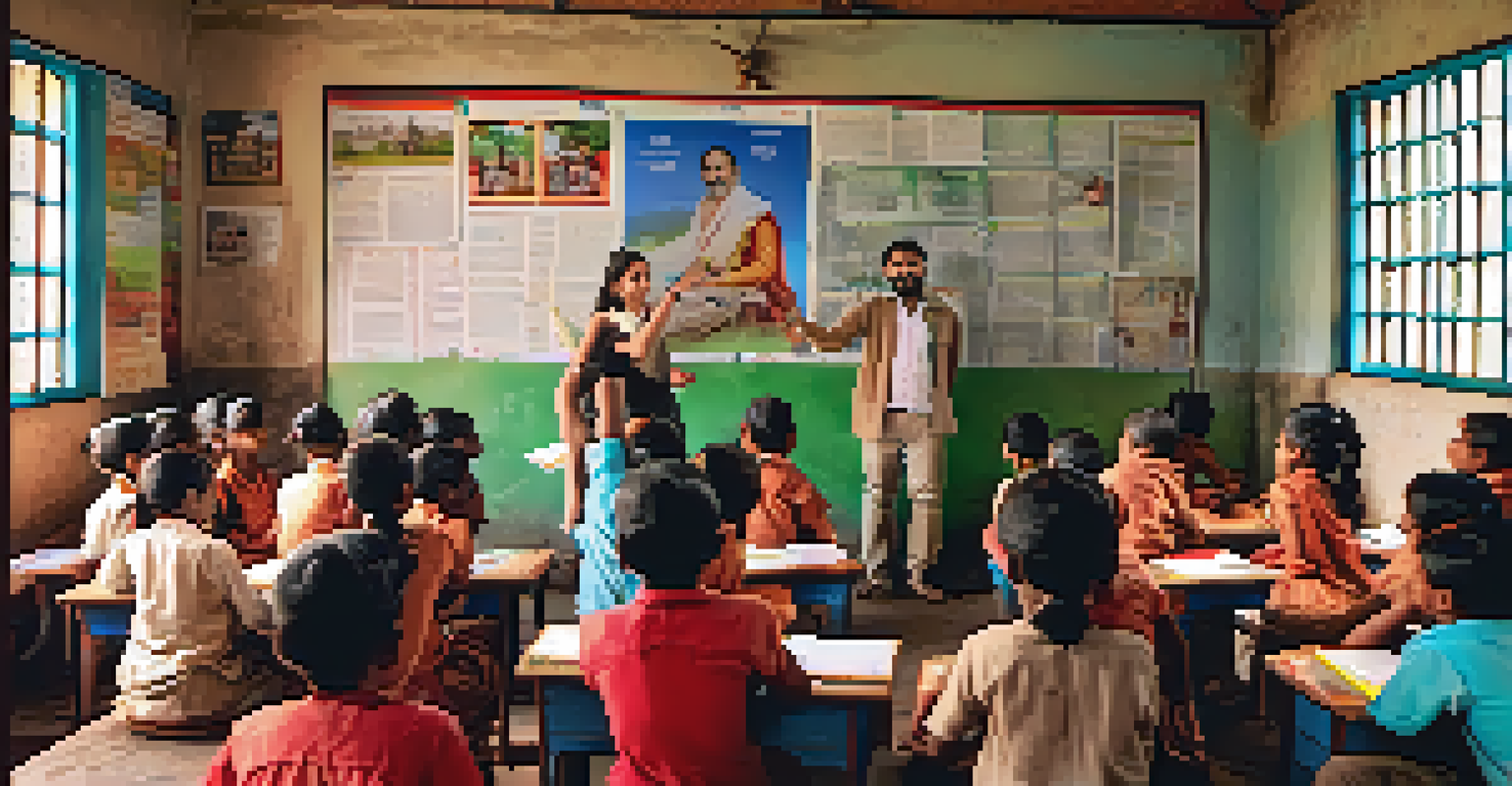How Volunteer Tourism Benefits Local Communities in India

Understanding Volunteer Tourism and Its Purpose
Volunteer tourism, often referred to as 'voluntourism,' combines travel with community service. It allows travelers to immerse themselves in local cultures while contributing positively to the areas they visit. This unique blend of leisure and altruism creates experiences that are enriching for both volunteers and locals alike.
The best way to find yourself is to lose yourself in the service of others.
In India, where diverse communities face various challenges, volunteer tourism can be particularly impactful. Travelers often engage in projects like education, healthcare, and environmental conservation, which directly address local needs. This not only benefits the communities but also fosters a deeper connection between visitors and the places they serve.
As travelers participate in volunteer projects, they gain a better understanding of the socio-economic issues faced by local populations. This awareness can lead to more responsible travel practices and encourage ongoing support for the communities long after their visit.
Economic Benefits of Volunteer Tourism
One of the most immediate benefits of volunteer tourism is its positive economic impact on local communities. When tourists come to volunteer, they often spend money on accommodation, food, and transportation, boosting the local economy. This influx of cash can help sustain local businesses and create jobs.

Moreover, many volunteer programs are designed to invest directly in community projects. For instance, funds collected from volunteers may go towards building schools, improving healthcare facilities, or supporting local artisans. This not only creates tangible benefits but also empowers communities to develop sustainably.
Voluntourism Benefits Local Economies
Volunteer tourism boosts local economies by increasing spending on accommodations, food, and transportation while supporting community projects.
Additionally, volunteer tourism can help diversify local economies that may rely heavily on agriculture or traditional industries. By attracting a steady stream of volunteers, communities can explore new avenues for growth, such as eco-tourism or cultural exchanges, ultimately leading to more resilient economies.
Empowering Local Communities through Education
Education is a cornerstone of many volunteer tourism initiatives in India. Volunteers often work in schools, teaching English or providing tutoring in various subjects. This not only enhances the learning experience for students but also inspires a love for education that can last a lifetime.
Volunteering is at the very core of being a human. No one has made it through life without someone else’s help.
By sharing their knowledge and skills, volunteers contribute to the development of local educators as well. Workshops and training sessions can help teachers improve their techniques and adapt to modern educational practices, ultimately benefiting students further.
Moreover, the presence of foreign volunteers can spark interest in global cultures and ideas among students. This exposure can broaden their horizons, fostering a generation that is more connected to the world and better prepared for future opportunities.
Fostering Cultural Exchange and Understanding
Volunteer tourism creates a platform for cultural exchange, allowing volunteers and locals to learn from each other. As travelers engage with community members, they share stories, traditions, and perspectives, enriching the experience for everyone involved. This two-way learning fosters mutual respect and understanding.
For many volunteers, visiting India offers a chance to step outside their comfort zones and experience a different way of life. This immersion can challenge preconceived notions and stereotypes, leading to personal growth and a deeper appreciation for diversity.
Education Drives Community Development
Through teaching and training, volunteers enhance educational opportunities, inspiring local educators and students alike.
Similarly, local communities benefit from this exchange by gaining insights into different cultures. This exposure can inspire creativity and innovation, helping locals adapt to global trends while preserving their unique identities.
Contributing to Environmental Conservation Efforts
Many volunteer tourism projects in India focus on environmental conservation. Volunteers often participate in activities like tree planting, wildlife conservation, and clean-up drives, helping to protect the country's rich biodiversity. This hands-on involvement fosters a sense of stewardship among participants and locals alike.
By engaging in these initiatives, volunteers raise awareness about environmental issues within the community. Their efforts can lead to long-term changes in attitudes and behaviors, encouraging sustainable practices that benefit both people and the planet.
Furthermore, these projects can enhance the natural beauty of local areas, making them more attractive to future tourists. As communities embrace eco-friendly tourism, they can harness the economic benefits while preserving their natural resources for generations to come.
Building Long-lasting Relationships and Networks
One of the most rewarding aspects of volunteer tourism is the connections formed between volunteers and local communities. These relationships can lead to ongoing collaborations, where volunteers return to support projects or locals pursue opportunities abroad. This creates a network of support that transcends borders.
In many cases, volunteers become advocates for the communities they serve, sharing their experiences with friends and family. This word-of-mouth promotion can encourage more travelers to engage in volunteer tourism, further benefiting local communities and enhancing cultural exchange.
Cultural Exchange Enhances Understanding
Voluntourism fosters cultural exchange, allowing both volunteers and locals to learn from each other, promoting mutual respect and personal growth.
Additionally, these relationships can lead to personal growth for both volunteers and locals. The bonds formed through shared experiences often evolve into lifelong friendships, creating a sense of belonging and understanding that enriches everyone involved.
Challenges and Considerations in Volunteer Tourism
While volunteer tourism offers numerous benefits, it's essential to acknowledge the challenges that come with it. Not all volunteer programs operate with the best intentions, and some may inadvertently cause harm to local communities. It's crucial for volunteers to research organizations thoroughly before committing to a project.
Moreover, there's a risk of creating dependency on foreign aid. Communities may become reliant on volunteer support rather than developing their own solutions to challenges. This highlights the importance of sustainable practices and empowering locals to take the lead in their development.

Finally, volunteers should approach their experiences with humility and openness. Recognizing that they are guests in another culture is vital to fostering genuine connections and ensuring that their efforts truly benefit the communities they aim to serve.